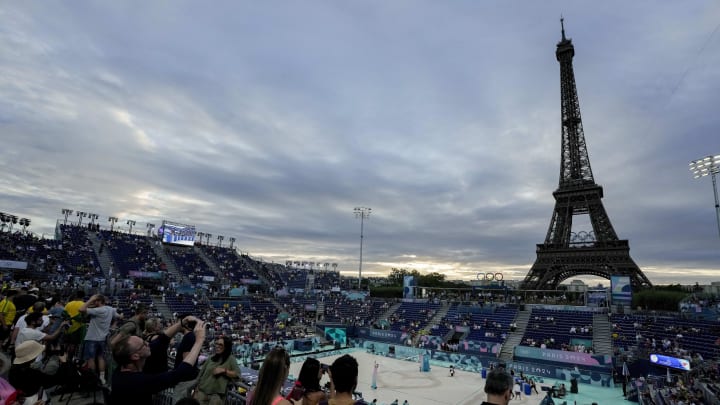Paris Olympics Perfectly Captured the Spirit of Its Host City

PARIS – The signs hanging outside the apartment windows on Rue Lepic say A VENDRE. The listing says Vincent Van Gogh lived there from 1886 to 1888. In many cities, this would be a prime tourist attraction. In Paris, it is an apartment for sale. The city’s cultural soil is too rich to build a museum on every block where one belongs.
It was here that Van Gogh painted “View From Theo’s Apartment,” which is now on display at the Van Gogh Museum in Amsterdam, though the notion of a Van Gogh Museum would have seemed laughable at the time, and perhaps not even appealing to the artist: “To succeed you have to have ambition,” Vincent once wrote to his brother Theo, “and ambition seems absurd to me.”
Van Gogh lived in Theo’s apartment and off his brother’s largesse. He did not sell a single painting. Once, he tried to stage an art exhibition at a restaurant called Petit Boulevard. According to the Van Gogh Letters project, the evening ended with “a violent altercation between the owner and Vincent,” who placed all the paintings in a wheelbarrow and pulled them back to the apartment that is now a vendre.
Elsewhere in Paris, a young man who did not think ambition seemed absurd was still refining his own. Pierre de Coubertin had read about the ancient Olympics in school, and he firmly believed proper schooling should include physical exercise—a belief that contradicted Parisian society at the time. But he had not yet solidified the idea that would later be attributed to him: A sporting event among nations around the world.
Their passions would pull them out of Paris. Van Gogh would go south to Arles, where he would have one of the most extraordinary creative periods in human history, but not what he really sought: An artist’s colony that brought peace to his brain. Coubertin would go on trips to England and the United States, to study the role of sport.
At the 1889 World’s Fair in Paris, as visitors climbed the brand-new Eiffel Tower, Coubertin organized the Congress on Questions of Physical Education. Painter Paul Gauguin, who had joined Van Gogh for a tumultuous period in Arles that ended with Van Gogh severing his own ear, held an exhibition on the grounds of the World’s Fair.
The next year, Van Gogh completed the only art sale of his lifetime, getting 400 francs from a friend for “The Red Vineyard.” Three months later, his mind finally lost him for good: He shot himself in the chest with a revolver. Two years later, in a speech at the Sorbonne on Paris’s left bank, Coubertin delivered a speech that ended with a request for help with “this grandiose and beneficent work: the re-establishment of the Olympic Games.”
Van Gogh and Coubertin continue to influence society in ways neither man could possibly have imagined. The Olympics that just concluded owe an enormous debt to both.
As much as any people in the world, Parisians believe in art as something that should be experienced communally but absorbed individually. These Olympics were an expression of that. The opening ceremony was more open than it ever has been: They included the Eiffel Tower, Trocadero, the Seine, and Tuileries Garden, and the torch was passed from French soccer legend Zinedine Zidane to stars who hail from other countries before being returned to the French.
Sometimes the Olympics seem to take place in a city inside a city. The only indication that the 2022 Winter Olympics were in China was that the government always seemed to be watching. Russia built a complex for Sochi that felt like it might all get torn down the day after everybody left. Most of the venues in Rio de Janeiro felt like they could have been anywhere.
Almost every event in Paris reminded visitors they were in Paris. The goal was not just to identify the best. It was to experience beauty.
Beach volleyball was under the Eiffel Tower. Equestrian events often seem out of place at the Olympics and are generally ignored, but at Versailles they seemed like they belonged.
The various stages added grandeur to events that often seem like afterthoughts. Archery at Invalides, where Napoleon is buried, was breathtaking. The purest joy I saw from any athlete during the entire Olympics came from France’s Lisa Barbelin after she won bronze. The achievement would have been the same anywhere, but it would not have resonated in the same way.
Food at Olympic venues is generally made of one part old bread and two parts foam packaging. In France, it was a proper reflection of the Parisian ethos: Sports should be a lived experience, not just a vehicle for achievement.
At times, the Olympics can feel like an act of abuse toward the home country: An expense the people cannot afford, and a party they don’t really want to hold. At other times, the Olympics can feel like an act of abuse from the home country: An authoritarian government projecting its preferred image onto athletes who just want to compete.
Whether these Olympics made economic sense for the host country is a fair and worthy question. The answer is usually no. But the Olympics were not just in France; they were of France. The introduction of any athlete from France drew an enormous ovation, but other than boos for American basketball star Joel Embiid, who was repeatedly booed for choosing to represent the U.S. over France, fans seemed to cheer greatness no matter whose flag it honored.
Track and field can seem busier than Atlanta’s airport: A throwing event over here, a leaping event over there, a race snaking in between them. At Stade de France, there seemed to be a pause of appreciation for everything. Even the shot put is best when it is experienced communally but absorbed individually.
Because they were integrated into one of the world’s most beautiful cities, these Olympics had time to breathe. Stop at a boulangerie, take in a tennis match, visit Musee D’Orsay. Grace and charm emerged in the most unlikely places: When Grenada’s javelin bronze medalist Anderson Peters took a photo with Pakistan’s gold medalist Arshad Nadeem and India’s silver medalist Neeraj Chopra, it was the first time athletes from those three countries had ever shared a podium, and possibly the first time athletes from those three countries had ever shared a selfie.
Long after the first modern Olympics, in Athens in 1896, Pierre de Coubertin declared that “a little female Olympiad” was not worth the effort it would take, and he referred to the inclusion of women as “impractical, uninteresting, ungainly.” Coubertin’s vision did not just outlive him. It outshined him.
“I’m well aware that these big, long canvases are hard to sell,” Vincent Van Gogh once wrote to his brother, “but in time people will see that there’s open air and good cheer in them.”
